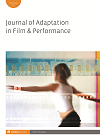- Home
- A-Z Publications
- Journal of Adaptation in Film & Performance
- Previous Issues
- Volume 6, Issue 2, 2013
Journal of Adaptation in Film & Performance - Volume 6, Issue 2, 2013
Volume 6, Issue 2, 2013
-
-
The art of avoidance: Avoidance as a means of (re)creation in a prequel adaptation to Shakespeare’s King Lear
More LessAbstractThis article attempts to give a reading of a play by Elaine Feinstein and the Women’s Theatre Group, Lear’s Daughters through/with Stanley Cavell’s essay ‘The avoidance of love’. It examines how avoidance and causality re- and de-form, recreate King Lear in Lear’s Daughters. Cavell’s essay serves as a guideline, an ‘inter-text’ or a bridge between the two plays in question, providing all the key notions and thoughts by which the prequel’s creative art of avoidance can be examined, as here avoidance will be possible to comprehend as a means of creation, or a writing technique.
-
-
-
Eurhythmatic analysis: A rhetoric of adaptation
More LessAbstractThis article proposes that many of the persistent and nagging problems that plague adaptation studies can be solved by consideration of the ancient and modern invocations of the rhetorical term Eurhythmia. Adaptation studies – or the analysis of the ways texts are changed as they are transplanted from mode to mode – constantly struggles to resist the impulse to denigrate new textual instantiations out of hand as ‘less than’ a revered form, bestowing a metaphor of emanation and corruption on the adaptation. A eurhythmatic approach, conversely, advocates the use of rhetorical strategies arising out of considerations of audience, purpose and context, in order to analyse these modal shifts. Being first concerned with ‘the right fit for the right purpose’, eurhythmia gives us the tools to see adaptations in a constellation of textual associations and material contexts that in turn allow us to understand why some adaptations succeed and why others fail.
-
-
-
Musical topics, historical styles and narrative in Carl Davis’s score for Pride and Prejudice (1995)
More LessAbstractIn critical commentary on Jane Austen film adaptations, Carl Davis’s musical score for the British Broadcasting Corporation’s television series Pride and Prejudice has been hailed as ‘historically accurate’. However, its use of ‘period’ instruments actually reflects the modern ‘early music’ movement, and its selections of diegetic music by canonic composers serve to create the cultural prestige associated with heritage productions. The nondiegetic portions of the score, which imitate a century of musical topics, styles and genres, are central to the novel’s adaptation to film. A musico-historical continuum – from Baroque dance to classical sonata form to a Romantic leitmotif – provides its own meanings, and in some instances the musical score becomes the primary transmitter of the film’s narrative. The ‘original’ time period referenced by a musical cue signals information about a character’s class status, personality, and actions, and the musical ‘historicism’ of Davis’s score sometimes provides the ironic commentary characteristic of Austen’s writing.
-
-
-
Wuthering Heights: A radio adaptation
More LessBy Lucy GoughAbstractA radio adaptation of Emily Brontë’s Novel Wuthering Heights commissioned by the BBC for the Radio 4 Woman’s Hour series. This adaptation is spread over fifteen episodes and deliberately gives the second half of the book as much time as the more popular first half. This version has also deliberately embraced the medium of radio, hence the house ‘Wuthering Heights’ has been given a voice. Hopefully this brings the world of the book directly into the mind of the listener, with all the brooding passion, cruelty, and darkness it contains. It is a novel of extremes, love and hate, hell and heaven, life and death, man and beast it is also about breaking boundaries and promises. I hope by paring the book back to its bones I have managed to capture some of this in its new form.
-
-
-
Anthony Minghella: Aautobiographical memory and the creation of an adapted screenplay
More LessAbstractThe following article uses as its source material interviews with the director and screenwriter Anthony Minghella which I carried out between 2003 and 2006. Minghella approached the adaptation of a novel in a particular way and I would contend he adapted autobiographical memories in the same way he adapted novels. In this article I will consider how Minghella drew on his memories both of the texts he adapted and his autobiographical memories in order to create screenplays.
-
Volumes & issues
Most Read This Month

Most Cited Most Cited RSS feed
-
-
Editorial
Authors: Richard Hand and Katja Krebs
-
- More Less

